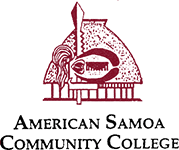American Samoa Community College MOODLE
15 Week Session
This course is designed to provide the students with needed practical skills in an agricultural setting in the following two options: Land Grant Research Station or On-Farm Work. (Note: 1 lab credit)
- Teacher: Otto Hansell
This course provides an introduction to the economics of agricultural production, marketing, pricing, income and decision-making involving farm operations that includes government policies and programs related to agricultural and socioeconomic problems of farmers. (Note: 3 lecture credits)
- Teacher: Ionatana Faasavalu
This course opens to all students in developmental studies as an introduction in general agriculture, animal science or natural resource management. Lectures, discussions, and presentations by experts and community members will include topics such as agriculture, livestock, nutrition, breeding, management, and pasture/turf grass, meat processing and marketing. Emphasis will be on swine and poultry production. Students who plan to further their studies of Agriculture beyond the A.S. level must take both this course and ANS 150B. (Note: 2 lecture credits)
- Teacher: Otto Hansell
A supplement to ANS 150A that provides a complete, in- depth, introductory animal science course. This two-credit discussion and lecture course will provide further detail on livestock anatomy, physiology, nutrition, genetics and global livestock systems. This course is intended to be a more rigorous scientific examination of livestock production. (Note: 2 lecture credits)
- Teacher: Otto Hansell
This course is an introduction to the science of nutrition as it applies to everyday life. The goal is to teach students how to apply the logic of science to their own nutritional concerns. Topics include the six major nutrients: carbohydrates, lipids (fats), protein, vitamins, minerals, and water. The course will also examine the human body, energy balance, weight control, the digestive process, life stages, and diseases as they relate to nutrition and fitness. (Note: 3 lecture credits)
- Teacher: Travis Fleming
